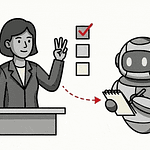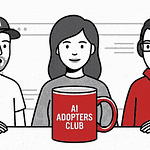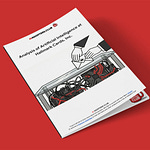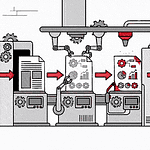I'm heading to the "Don't Die Summit" in Miami this weekend. Yes, that's what it's actually called. No, I'm not making this up.
While we usually dissect how corporations butcher AI implementation, today we're exploring something equally fascinating: how the same tech that's generating your quarterly reports might help you live long enough to see a hundred of them.
Cut the Hype: What's Really Happening
Let's get this straight: AI isn't magically granting immortality. But unlike most corporate AI initiatives, the longevity sector is actually building something useful.
The research community has shifted from treating individual diseases to targeting the root causes of aging itself. They're not just managing decline—they're trying to rewrite the rules.
Some AI models are boldly predicting human lifespans of 150 years. That's probably optimistic—like your company's AI transformation timeline. But unlike your digital transformation that transformed nothing, longevity research is delivering tangible results.
Three Areas That Sound Interesting To Me
1. Aging Clocks: Your Biological TPS Report
Forget your birthday—it's just a number on HR forms. Companies like Deep Longevity have built AI systems that measure your "biological age"—how old your body actually is versus what it says on your driver's license.
These systems analyze everything from blood markers to DNA methylation patterns to your gut microbiome—even voice patterns and facial features. Think of it as a performance review for your cells, but one that actually tells you something useful.
The gap between your biological age and chronological age (what researchers call "MileAge delta")—reveals whether you're aging faster or slower than average. It's like knowing if your project is ahead of schedule or doomed.
Some companies are even developing organ-specific aging clocks. Because yes, your liver might be working overtime while your brain is coasting—not unlike your actual team.
2. AI Drug Discovery: Skipping the 10-Year Meeting
Remember the last time your company tried to launch a new product? Five years of meetings, PowerPoints, and "strategic alignments" before anything happened?
Insilico Medicine isn't playing that game. They created Rentosertib, the first AI-designed drug for idiopathic pulmonary fibrosis (try saying that in a meeting) to reach human trials. Their AI identified both the target and designed the molecule in 18 months—not the decade it typically takes.
By 2025, they had 30+ drug candidates with 10 cleared for human trials. Their edge? Generative AI that designs molecules human scientists wouldn't dream up—like if ChatGPT actually generated useful code instead of apologizing for its limitations.
3. Digital Twins: Testing on Your Virtual Clone, Not Your Career
Imagine running experiments on a digital copy of yourself instead of risking your actual health. No more one-size-fits-all solutions that fit nobody.
Human Longevity, Inc. offers comprehensive assessments combining genome sequencing, advanced imaging, and biomarker analysis. Their AI flags health issues years before symptoms appear—like catching project failures before they tank your quarterly numbers.
This approach flips healthcare from "fix it when it breaks" to "prevent it from breaking"—a concept your IT department still hasn't grasped with your work laptop.
The Players: Who's Actually Building vs. Who's Just Talking
The longevity space is like your company's tech stack—a mix of innovative solutions and flashy vaporware. Here's who's doing what:
Insilico Medicine: Beyond creating actual drugs in trials, they've built a humanoid lab robot named "Supervisor" that wears a lab coat and learns by watching scientists. It's the lab assistant that doesn't steal your lunch from the fridge.
Deep Longevity: Creates AI aging clocks and partners with insurance companies to offer psychological age assessments via smartphone apps. They're building tools people actually use—a concept foreign to most enterprise software.
GERO.AI: Analyzes human data to identify aging targets and has achieved "systemic rejuvenation" in elderly mice with AI-predicted interventions. That's like promising your stakeholders results and actually delivering them.
Human Longevity, Inc.: Offers "Precision 100+" program targeting health beyond a century. Basically, the executive health plan that actually works.
This isn't some small side project. The longevity market is projected to grow from $2.7 billion in 2023 to $4.1 billion by 2030. Venture funding has exceeded $1 billion, with tech titans like Sam Altman, Jeff Bezos, and Peter Thiel writing serious checks.
The Future: Half Fascinating, Half Terrifying
The longevity field is moving toward sci-fi territory. Insilico's humanoid robot creates a closed loop where AI designs experiments, robots execute them, and results feed back into the AI—eliminating the human bottleneck that slows your company projects.
Some researchers envision AI-guided nanorobots patrolling our bloodstream like microscopic maintenance crews, clearing cellular debris and fixing tissues. It's still theoretical, but so was your company's digital transformation until it became unavoidable.
The Hard Parts Nobody Talks About
Like that AI implementation your CEO announced prematurely, longevity tech faces serious obstacles:
Biological Complexity: Aging involves countless interconnected biological pathways we don't fully understand—like your company's legacy systems that nobody documented.
Data Quality: AI models trained on biased or incomplete data will give you garbage results. Just like that predictive model your analytics team built using only successful sales data.
Ethical Questions: Who gets access to these technologies? What happens to retirement plans, healthcare systems, and social structures when people routinely live past 100? These are the societal implications your company's AI ethics statement glosses over.
Regulatory Hurdles: Convincing regulators to approve "anti-aging" treatments is tough since aging isn't classified as a disease—like trying to get budget approval for a project that doesn't fit existing categories.
The Bottom Line
Whether we'll live to 150 remains uncertain, but one thing's clear: AI is accelerating longevity research faster than your last software integration project.
For business leaders, this isn't just interesting—it's disruptive. Insurance models, retirement planning, healthcare delivery, and workforce dynamics will all need to adapt. The companies that anticipate these shifts will be positioned to thrive; the rest will end up like Blockbuster wondering what happened.
So while your enterprise struggles to use AI for basic process automation, other sectors are using it to fundamentally extend human life. Maybe that's worth thinking about during your next pointless status meeting.
Until next week, when we return to our regular programming of corporate AI follies.
P.S. If you found this interesting, please share it with a colleague whose AI strategy could use some life support.
This newsletter is part of the AI Adopters series, where we typically focus on practical AI integration for business. Today's special edition explores the frontier of AI in longevity research.

















